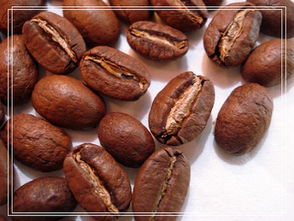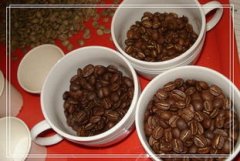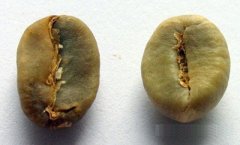Robusta that you don't know about coffee (part two)
If you want to ask the country or region that loves Robusta beans most, the first place is Italy, the hometown of espresso! If you narrow it down, to be more precise, the largest use of robusta beans is in southern Italy, such as Palermo, Naples and Sicilia. In fact, in southern Italy, most of the coffee people drink contains a considerable proportion of robusta beans. The content of 30% to 60 is commonplace, and the Robusta content of some formula beans is as high as 80% or even 100%!

Open the table of beans supplied by local wholesalers of raw coffee beans in Italy, and you will see a list of more than a dozen, or even as many as two dozen, raw beans from all over the world, for local coffee roasters to choose from. This phenomenon does not exist in other parts of the world, such as the United States and Canada, Northern Europe, Japan and even Taiwan.
You may wonder why the Italians mix a lot of robusta in Arabica beans. Generally speaking, Italians mix with Robusta in order to increase the Crema content of Espresso.
This is only half true, and there is another little-known reason.
It turned out that southern Italy used to be a relatively poor region, where people could only afford cheap coffee, so at first it was mixed with Robusta beans simply to reduce costs. However, after years of massive baking and blending of Robusta, coupled with Italy's natural sensitivity to cooking, they found that Robusta beans have many qualities that Arabica beans do not have. as long as you are familiar with and fully master these qualities, a good cook (coffee roaster) will be able to serve magical dishes (Italian coffee beans). Compared with 44 pairs of chromosomes in Arabica beans, Robbosa beans have only 22 pairs of chromosomes, with caffeine contents of 1.5% and 2.8%, respectively. The two are completely different varieties and cannot be mixed, which explains why there are many complete differences between the two.
I like to say that Arabica beans are like earthlings, which are easy to see and familiar to us. Rob Tadou is like an alien, although it has the appearance of being close to the people on earth, but it is actually completely different on the inside. Earthlings and aliens have their own advantages and disadvantages, and each has its own advantages and disadvantages. Although they are different races and cannot marry to have children, through exquisite arrangements, putting them together cleverly to make up for their weaknesses and full cooperation, they will be able to contribute their respective strengths and excite an amazing spark!
I was born to be useful. Robusta and Arabica are both gifts from angels, the difference is only in the use of people.
Important Notice :
前街咖啡 FrontStreet Coffee has moved to new addredd:
FrontStreet Coffee Address: 315,Donghua East Road,GuangZhou
Tel:020 38364473
- Prev

Robusta that you don't know about coffee (part one)
People always habitually look at things in dichotomy, good and bad, good and evil, good and bad. The same is true in the world of coffee. Arabica coffee beans are always classified as good, while its distant relative, Robusta, is often classified as bad. We might describe it this way, if Arabica is an angel's gift.
- Next

What's the difference between robusta coffee beans and Elaraby plus coffee beans?
Robusta coffee beans (Coffea canephora robusta variety) and Elaraby plus coffee beans (Coffea arabica) are commonly used by ordinary coffee bean manufacturers, and the taste of the two coffee beans will be different with different proportions. And what are the characteristics of these two kinds of coffee beans? The area where Robusta grows is 0800 meters above sea level, with a temperature of 1836 ℃ and an annual precipitation of 2200.
Related
- Beginners will see the "Coffee pull flower" guide!
- What is the difference between ice blog purified milk and ordinary milk coffee?
- Why is the Philippines the largest producer of crops in Liberia?
- For coffee extraction, should the fine powder be retained?
- How does extracted espresso fill pressed powder? How much strength does it take to press the powder?
- How to make jasmine cold extract coffee? Is the jasmine + latte good?
- Will this little toy really make the coffee taste better? How does Lily Drip affect coffee extraction?
- Will the action of slapping the filter cup also affect coffee extraction?
- What's the difference between powder-to-water ratio and powder-to-liquid ratio?
- What is the Ethiopian local species? What does it have to do with Heirloom native species?

